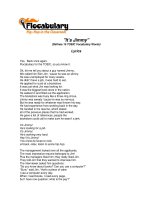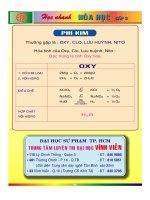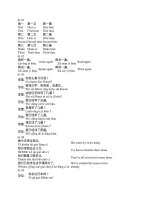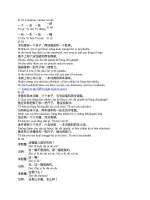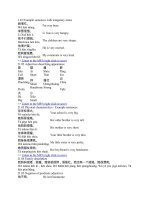Tài liệu học tiếng Trung - bài 2 pptx
Bạn đang xem bản rút gọn của tài liệu. Xem và tải ngay bản đầy đủ của tài liệu tại đây (281.64 KB, 54 trang )
1.01 Example sentences with temporary states
我很忙。
Wǒ hěn máng.
I'm very busy.
李雪很饿饿
Lǐ Xuě hěn è.
Li Xue is very hungry.
孩子饿饿饿饿
Háizǐmen hěn kùn.
The children are very sleepy.
他很饿饿饿
Tā hěn xīngfèn.
He is very excited.
我同屋很累。
Wǒ tóngwū hěn lèi.
My roommate is very tired.
>> Listen to the MP3 (right click to save)
21.02 Adjectives describing appearance
高
Gāo
Tall
矮
Ǎi
Short
瘦
Shòu
Thin
很
Pàng
Fat
漂亮
Piàoliɑng
Pretty
饿
Shuài
Handsome
饿饿
Qiángzhuàng
Strong
丑
Chǒu
Ugly
大
Dà
Big
小
Xiǎo
Small
>> Listen to the MP3 (right click to save)
21.03 Physical characteristics - Example sentences
很很校很大。
Nǐ xuéxiào hěn dà.
Your school is very big.
很哥哥很高。
Tā gēge hěn gāo.
Her older brother is very tall.
他饿饿饿饿饿
Tā māma hěn ǎi.
His mother is very short.
很弟弟很瘦。
Nǐ dìdi hěn shòu.
Your little brother is very thin.
我妹妹很漂亮。
Wǒ mèimei hěn piàoliɑng.
My little sister is very pretty.
很男朋友很饿饿
Tā nánpéngyou hěn shuài.
Her boyfriend is very handsome.
>> Listen to the MP3 (right click to save)
21.04 Family description
我饿饿饿饿饿饿饿饿饿饿饿饿饿饿饿饿饿饿饿饿饿饿饿饿饿饿饿饿饿饿饿
Wǒ māma hěn ǎi,hěn shòu. Wǒ bàbɑ hěn pàng, hěn qiángzhuàng. Wǒ yě yǒu yígè mèimei. Tā
hěn piàoliɑng.
21.05 Negation of predicate adjectives
他不饿饿
Tā bú shuài.
He isn't handsome.
李雪不高。
Lǐ Xuě bù gāo.
Li Xue is not tall.
很不瘦。
Tā bú shòu.
She isn't thin.
王饿饿饿饿
Wáng Jūn bú pàng.
Wang Jun is not fat.
饿饿饿饿饿饿
Zhāng lǎoshī bù ǎi.
Teacher Zhang is not short.
Notes:
Predicate adjectives are always negated with
bú, which always precedes the predicate adjective. You can not use 很 méi to negate a predicate
adjective.
21.06 Hair description vocabulary
饿饿
Tóufa
Hair
饿
Cháng
Long
短
Duǎn
Short
卷
Juǎn
Curly
直
Zhí
Straight
>> Listen to the MP3 (right click to save)
21.07 His hair is very short. - Example sentences
他的饿饿饿饿饿
Tā de tóufa hěn duǎn.
His hair is very short.
他女友的饿饿饿饿饿
Tā nǚyǒu de tóufa hěn cháng.
His girlfriend's hair is very long.
饿饿饿饿饿饿饿饿
Sàlā de tóufa hěn juǎn.
Sarah's hair is very curly.
李雪的饿饿饿饿饿
Lǐ Xuě de tóufa hěn zhí.
Li Xue's hair is very straight.
A Transcribe the characters below into pinyin
1.) 漂亮 _____________________ 2.) 瘦 ____________________
3.) 很 _____________________
4.) 饿饿 ____________________
5.) 饿饿 __________________ 6.) 饿 ___________________
B Match the words with the translation
1.) Cháng Curly
2.) Ǎi
Long
3.) Juǎn Only son
4.) Chǒu
Short
5.) Zhí
Ugly
6.) Dúshēngzǐ
Straight
C Transcribe the following sentences into pinyin
1.) 他妹妹很漂亮。
_______________________________________________________.
2.) 我女友的饿饿饿饿饿
_______________________________________________________.
3.) 很哥哥很瘦。
_______________________________________________________.
4.) 孩子饿饿饿。
_______________________________________________________.
D Circle the character that matches the pinyin
dú :
姓 瘦 很 北
qiáng :
很 饿 人 饿
tóu :
很 饿 瘦 直
shòu :
瘦 饿 叫 京
jiě :
姐 很 北 英
dì :
商 饿 弟
E Circle the two characters that are not the same
很 饿 矮 饿
饿 商 丑 美
商 饿 饿 美
很 饿 矮 高
F Translate the following pinyin into English
1.) Lǐ Xuě hěn shòu.
_______________________________________________________.
2.) Zhāng lǎoshī bù ǎi.
_______________________________________________________.
3.) Wǒ bàbɑ hěn pàng, hěn qiángzhuàng.
_______________________________________________________.
4.) Nǐ dìdi de tóufa hěn cháng.
_______________________________________________________.
G Make words by matching the two characters, then match them to the correct pinyin
介
饿
piàoliɑng
饿
亮
qiángzhuàng
饿 饿 tóufa
漂
饿 zhíyuán
饿
很
jièshào
H Circle the pinyin for the character
短 :
fāng xiōng jiàn duǎn
漂 :
jiě piào míng běi
饿 : xiān fāng shuài piào
丑 :
yǒu chǒu shuài fāng
直 :
zhí diǎn shén chǒu
很 :
zhí duǎn fāng zhuàng
I Fill in the blanks with the most appropriate choice
点
Diǎn
饿饿
Tóufa
有
Yǒu
卷
Juǎn
父母
Fùmǔ
1.) 很男朋友的 __________ 很短。
2.) 他女友的饿饿饿 __________ 。
3.) 我有 __________ 饿饿
4.) 他 __________ 是工人。
5.) 很 __________ 男朋友饿饿
22.01 Printed Materials
饿
Shū
Book
饿饿
Zázhì
Magazine
饿饿
Bàozhǐ
Newspaper
很饿
Huàbào
Pictorial
饿饿
Kèběn
Textbook
饿饿
Cídiǎn
Dictionary
小饿
Xiǎoshuō
Novel
地饿
Dìtú
Map
>> Listen to the MP3 (right click to save)
22.02 This and that - Example sentences
饿饿饿饿饿饿饿饿饿
Zhè shì shū, nà shì cídiǎn.
This is a book, that is a dictionary.
饿饿饿饿饿饿饿饿饿饿
Zhè shì bàozhǐ, nà shì zázhì.
This is a newspaper, that is a magazine.
饿饿饿饿饿饿饿饿饿饿
Zhè shì dìtú, nà shì bàozhǐ.
This is a map, that is a newspaper.
饿饿饿饿饿饿饿饿饿饿
Zhè shì kèběn, nà shì xiǎoshuō.
This is a textbook, that is a novel.
饿饿饿饿, 那是饿饿饿
Zhè shì cídiǎn, nà shì kèběn.
This is a dictionary, that is a textbook.
>> Listen to the MP3 (right click to save)
Notes:
饿 zhè and 那 nà are demonstrative pronouns, which means that they point out where something
is. 饿 zhè means this and 那 nà means that.
Pronunciation point:
You should be careful not to confuse 那 nà with the interrogative pronoun 很 nǎ. 那 nà has a
fourth tone falling sound, which sounds commanding or even angry to English speakers. nǎ has
the falling and then rising third tone, which to English speakers sounds a bit like someone who is
mildly incredulous of something.
22.03 Whose textbook is this? - Example sentences
那是饿饿饿饿饿
Nà shì shéi de zázhì?
Whose magazine is that?
饿饿饿饿饿饿饿
Zhè shì shéi de kèběn?
Whose textbook is this?
那是饿饿饿饿饿
Nà shì shéi de bàozhǐ?
Whose newspaper is that?
饿饿饿饿饿饿?
Zhè shì shéi de cídiǎn?
Whose dictionary is this?
饿饿饿饿饿饿?
Zhè shì shéi de huàbào?
Whose pictorial is this?
>> Listen to the MP3 (right click to save)
Notes:
The structural particle 的 de is usually put between the interrogative pronoun 饿 shéi and the
noun it is an attributive of.
22.04 It's the teacher's book
饿饿:
饿饿饿饿饿
Zhè shì shénme?
王饿:
饿饿饿饿
Zhè shì shū.
饿饿:
饿饿饿饿饿饿
Zhè shì shéi de shū?
王饿:
饿饿饿饿饿饿饿
Zhè shì lǎoshī de shū.
22.05 This is my roommate's magazine - Concept review dialogue
饿饿:
那是什饿饿
Nà shì shénme?
李雪:
那是饿饿饿
Nà shì zázhì.
饿饿:
那是饿饿饿饿饿
Nà shì shéi de zázhì?
李雪:
那是我同屋的饿饿饿
Nà shì wǒ tóngwū de zázhì.
22.06 Which magazine is yours? - Example sentences
很本饿饿饿饿饿饿
Nǎ běn zázhì shì nǐ de?
Which magazine is yours?
很本小饿饿饿饿饿
Nǎ běn xiǎoshuō shì tā de?
Which novel is his?
很本饿饿饿饿饿饿
Nǎ běn cídiǎn shì tā de?
Which dictionary is hers?
很本饿饿饿饿饿饿
Nǎ běn shū shì Wáng Jūn de?
Which book is Wang Jun's?
很饿饿饿饿饿饿饿
Nǎ zhāng dìtú shì wǒ de?
Which map is mine?
22.07 Sentences with possessive pronouns
饿饿饿饿饿饿饿
Zhè běn shū shì wǒ de.
This book is mine.
那本饿饿饿饿饿饿饿饿
Nà běn kèběn shì wǒ tóngwū de.
That textbook is my roommate's.
饿饿饿饿饿饿饿饿
Zhè běn zázhì shì tā de.
This magazine is his.
那很饿饿饿饿饿饿饿饿
Nà fèn bàozhǐ shì Zhāng Lǎoshī de.
That newspaper is Zhang teacher's.
Pronunciation point:
饿 Zhè and 那 nà is the pronunciation you typically find in textbooks, but sometimes they may be
pronounced as zhèi and nèi, respectively. This pronunciation is only used when the words are
specifying which is which, as in "Which book out of all of these are Anna's? - This one."
Zhèi and nèi is considered to be less standard pronunciation, so there's no reason to worry about
it too muc 去 h. If you are living in China and in a region where zhèi and nèi are being used you
will probably pick them up instinctually, the way one picks up slang. Otherwise, you can never
go wrong saying Zhè and nà.
22.08 Is this your dictionary?
李雪:
那本饿饿饿饿饿饿饿饿
Nà běn cídiǎn shì bú shì nǐ de?
饿饿:
那本饿饿饿饿饿饿
Nà běn cídiǎn shì wǒ de.
李雪:
饿饿饿饿饿饿饿饿饿饿
Zhè běn cídiǎn shì bú shì wǒ de?
饿饿:
饿饿饿饿饿饿饿饿
Zhè běn cídiǎn shì nǐ de.
22.09 The Horrors of Pronunciation
直
Zhí
Straight
饿
Zhǐ
Paper
志
Zhì
Sign
A Transcribe the characters below into pinyin
1.) 饿饿 _____________________ 2.) 饿饿 ____________________
3.) 很饿 _____________________
4.) 饿饿 ____________________
5.) 地饿 __________________ 6.) 小饿 ___________________
B Translate the pinyin into English
1.) Qiángzhuàng __________________ 2.) Cídiǎn ______________
3.) Bàozhǐ _________________
4.) Piàoliɑng ________________
5.) Xiǎoshuō _________________ 6.) Dìtú ________________
C Match the words with the translation
1.) 饿饿 Novel
2.) 小饿
Magazine
3.) 饿饿 Strong
4.) 漂亮
Hair
5.) 饿饿
Pretty
6.) 饿饿
Newspaper
D Transcribe the following sentences into pinyin
1.) 那本饿饿饿饿饿饿饿饿
_______________________________________________________.
2.) 饿饿饿饿饿饿饿饿
_______________________________________________________.
3.) 很本小饿饿饿饿饿
_______________________________________________________.
4.) 很饿饿饿饿饿饿?
_______________________________________________________.
5.) 饿饿饿饿饿饿饿饿饿。
_______________________________________________________.
E Circle the character that matches the pinyin
tú :
饿 瘦 很 饿
diǎn :
很 典 直 饿
bào :
饿 饿 瘦 直
zá :
瘦 饿 饿 饿
dì :
地 很 志 饿
cí :
饿 商 志 弟
F Translate the following pinyin into English
1.) Zhè shì shū, nà shì cídiǎn.
_______________________________________________________.
2.) Nà běn kèběn shì wǒ tóngwū de.
_______________________________________________________.
3.) Nǎ běn zázhì shì nǐ de?
_______________________________________________________.
4.) Zhè shì shéi de shū?
_______________________________________________________.
5.) Zhè shì bàozhǐ, nà shì zázhì.
_______________________________________________________.
G Fill in the blanks
饿饿: Nà shì ________?
李雪:
_____ shì _______ .
饿饿:
Nà shì ______ de zázhì?
李雪:
Nà _____ wǒ tóngwū de ________ .
H Arrange the words into sentences
1.) zázhì shì Zhè běn de tā .
_______________________________________________________.
2.) tóngwū shì bàozhǐ fèn wǒ Nà de .
_______________________________________________________.
3.) wǒ péngyou shū shì de Nà .
_______________________________________________________.
4.) shéi de Nà shì zázhì ?
_______________________________________________________.
I Write questions for the following answers
1.) _______________________________________________________?
饿饿饿饿饿饿饿 Zhè běn shū shì tā de.
2.) _______________________________________________________?
那是饿饿。 Nà shì bàozhǐ.
3.) _______________________________________________________?
饿是我同屋的小饿饿 Zhè shì wǒ tóngwū de xiǎoshuō.
4.) _______________________________________________________?
饿是很饿饿 Zhè shì huàbào.
23.01 What kind of book is this?
大饿:
饿饿饿饿饿
Zhè shì shénme?
小饿:
饿饿饿饿
Zhè shì shū.
大饿:
饿饿饿饿饿饿
Zhè shì shénme shū?
小饿:
饿饿饿饿饿饿
Zhè shì Yīngyǔ shū.
大饿:
饿饿饿饿饿饿
Zhè shì shéi de shū?
小饿:
饿饿饿饿饿饿
Zhè shì wǒ de shū.
23.02 What kind of magazine is this?
饿饿:
饿饿饿饿饿
Zhè shì shénme?
饿饿:
饿饿饿饿饿
Zhè shì zázhì.
饿饿:
饿饿饿饿饿饿饿
Zhè shì shénme zázhì?
饿饿:
饿饿饿饿饿饿饿
Zhè shì xuésheng zázhì.
饿饿: 饿饿饿饿饿饿饿
Zhè shì shéi de zázhì?
饿饿饿:
饿饿饿饿饿饿饿饿
Zhè shì Lǐ Xuě de zázhì.
23.03 What's its Chinese title?
饿饿饿:
安娜 ,饿饿饿饿饿饿饿饿饿饿饿饿
Ānnà, zhè shì shéi de shū? Shì nǐ de shū ma?
安娜:
不是我的很,是我朋友的。
Bú shì wǒ de a, shì wǒ péngyou de.
饿饿饿:
饿饿饿饿饿饿
Zhè shì shénme shū?
安娜:
很,一本小饿饿
Ò, yì běn xiǎoshuō.
饿饿饿:
很的饿饿饿饿饿饿饿饿饿饿饿饿饿
Zhēn de ma? Nà tā de Zhōngwén míngzi shì shénme?
安娜:
我不知道。
Wǒ bù zhīdào.
23.04
莎拉:
饿饿饿饿饿饿
Zhè shì shéi de shū?
饿饿:
我同屋的。
Wǒ tóngwū de.
莎拉:
那本很?
Nà běn ne?
饿饿:
是我的。
Shì wǒ de.
23.05 Whose book bag is this?
李雪:
饿饿饿饿饿饿饿
Zhè shì shéi de shūbāo?
王饿:
我的。
Wǒ de.
李雪:
那很很?
Nà ge ne?
王饿:
我室友的。
Wǒ shìyǒu de.
Notes:
The head noun can be left out if it is understood what is being referred to, this is a form of
ellipsis. It is understood in the question 那很很? Nà ge ne? the 那很 Nà ge refers to 那很饿饿
Nà ge shūbāo, so there is no need to restate the noun for a second time.
Vocabulary point:
饿饿 shūbāo means bookbag. The word is made exactly the same as in English, by joining the
word 饿 shū book to 包 bāo bag.
23.06 What kind of map is this?
饿饿:
饿饿饿饿饿饿饿饿饿饿饿
Mǎtè,zhè shì nǐ de běnzi ma?
饿饿:
是。
Shì.
饿饿:
饿饿饿饿饿饿饿饿
Zhè shì nǐ de dìtú ma?
饿饿:
不是,饿饿饿饿饿饿饿饿
Bú shì, zhè shì Wáng Jūn de dìtú.
饿饿:
饿饿饿饿饿饿饿
Zhè shì shénme dìtú?
王饿:
饿饿饿饿饿饿饿饿
Zhè shì Shànghǎi shì dìtú.
Vocabulary point:
上海市 Shànghǎi shì means Shanghai City.
23.07 Review
大饿:
很有饿饿饿?
Nǐ yǒu cídiǎn ma?
小饿:
我很有饿饿饿
Wǒ méi yǒu cídiǎn.
大饿:
那饿饿饿饿饿饿饿饿
Nà zhè běn cídiǎn shì shéi de?
小饿:
我不知道。
Wǒ bù zhīdào.
A Match the words with the translation
1.) Cídiǎn Magazine
2.) Shuài
Dictionary
3.) Zázhì Thin
4.) Kèběn
Fat
5.) Shòu
Map
6.) Pàng
Handsome
7.) Dìtú
Textbook
B Match the characters with the pinyin
1.) 饿饿 Shūbāo
2.) 本子
Xiǎoshuō
3.) 同屋
Dìtú
4.) 饿包
Bàozhǐ
5.) 地饿
Běnzi
6.) 小饿
Tóngwū
C Transcribe the following sentences into pinyin
1.) 饿饿饿饿饿饿饿
_______________________________________________________.
2.) 那饿饿饿饿饿饿饿饿
_______________________________________________________.
3.) 饿饿饿饿饿饿饿
_______________________________________________________.
4.) 饿饿饿饿饿饿饿?
_______________________________________________________.
D Translate the following pinyin into English
1.) Zhè shì shénme shū?
_______________________________________________________.
2.) Wǒ méi yǒu cídiǎn.
_______________________________________________________.
3.) Zhè shì Shànghǎi shì dìtú.
_______________________________________________________.
4.) Zhè shì shéi de zázhì?
_______________________________________________________.
E Circle the pinyin for the character
地 :
pàng dì zhī diǎn
很 :
huà xiǎo shén tóng
包 :
zhè bāo běn zhǐ
本 :
cí wū běn tú
饿 : dì yǒu shū cí
友 :
bāo yǒu huà cí
F Fill in the blanks with the appropriate word
大饿:
Nǐ yǒu __________ ma?
小饿:
_______ méi _________ cídiǎn.
大饿:
Nà _______ běn cídiǎn shì _________ de?
小饿:
Wǒ bù _________ .
G Fill in the blanks with the appropriate word
饿饿:
Mǎtè,zhè _____ nǐ de běnzi ma?
饿饿: Shì.
饿饿: Zhè shì ______ de _______ ma?
饿饿: Bú _______ , zhè shì Wáng Jūn _______ dìtú.
饿饿: Zhè shì ________ dìtú?
王饿:
Zhè shì Shànghǎi shì _______.
H Circle the character that matches the pinyin
zhì :
地 饿 饿 志
kè :
饿 志 饿 饿
shū :
饿 饿 叫 好
yǔ :
饿 饿 饿 地
dào :
饿 地 饿 道
shì :
美 很 室 饿
24.01 Kinds of Writing Utensils
饿饿
Qiānbǐ
Pencil
水彩很
Shuǐcǎibǐ
Watercolor
brush
饿饿
Gāngbǐ
Pen
毛很
Máobǐ
Brush
很很
Làbǐ
Crayon
24.02 Whose brush is this?
饿饿:
饿饿饿饿饿
Zhè shì shénme?
王饿:
饿饿饿饿
Zhè shì bǐ.
饿饿:
饿饿饿饿饿饿
Zhè shì shénme bǐ?
王饿:
饿饿饿饿饿
Zhè shì máobǐ .
饿饿:
饿饿饿饿饿饿饿
Zhè shì shéi de máobǐ?
王饿:
饿饿饿饿饿饿饿饿饿
Zhè shì wǒ tóngxué de máobǐ .
24.03 Do you have a pen? Do you have a pencil?
安娜:
很有饿饿饿饿
Nǐ yǒu gāngbǐ ma?
饿饿饿:
我很有饿饿饿
Wǒ méi yǒu gāngbǐ.
安娜:
那很有饿饿饿饿
Nǐ yǒu qiānbǐ ma?
饿饿饿:
我也很有饿饿饿
Wǒ yě méi yǒu qiānbǐ.
24.04 Whose pen is this?
莎拉:
饿饿饿饿饿饿饿
Zhè zhī bǐ shì shéi de?
李雪:
是我的。
Shì wǒ de.
莎拉:
那支是不是很的?
Nà zhī shì bú shì nǐ de?
李雪:
不是。
Bú shì.
24.05 Are you his secretary?
大饿:
他是饿饿饿饿饿
Tā shì Yáng jīnglǐ ma?
王冬梅:
饿饿饿饿饿饿饿饿
Duì, tā shì Yáng jīnglǐ.
大饿:
很是他的秘饿饿饿
Nǐ shì tā de mìshū ma?
王冬梅:
是,我是他的秘饿饿
Shì, wǒ shì tā de mìshū.
24.06 This is Anna from my company
王冬梅:
很很,很好!
Bàbɑ, nǐ hǎo!
父饿:
很,很,很,很,快饿饿饿饿饿饿
Ō, lái, lái, lái, kuài qǐng jìn, qǐng jìn.
王冬梅:
饿饿饿饿饿饿饿饿饿饿饿饿饿饿饿饿
Zhè shì wǒ bàbɑ. Zhè shì wǒmen gōngsī de Ānnà.
安娜:
很好,伯父!
Nín hǎo, bófù!
父饿:
很好,饿饿饿
Nǐ hǎo, qǐng zuò.
A Transcribe the characters below into pinyin
1.) 饿 _____________________
2.) 秘饿 ____________________
3.) 饿饿 _____________________ 4.) 饿饿 ____________________
5.) 毛很 __________________ 6.) 支 ___________________
B Transcribe the following sentences into pinyin
1.) 饿饿饿饿饿饿饿
_______________________________________________________.
2.) 很有饿饿饿饿
_______________________________________________________.
3.) 饿饿饿饿饿饿?
_______________________________________________________.
4.) 很是他的秘饿饿?
_______________________________________________________.
C Translate the pinyin into English
1.) Cídiǎn __________________ 2.) Qiānbǐ ______________
3.) Zázhì _________________ 4.) Gāngbǐ ________________
5.) Máobǐ _________________ 6.) Kèběn ________________
D Circle the two characters that are not the same
饿 饿 自 累
很 饿 理 美
饿 很 美 饿
累 饿 自 理
E Circle the pinyin for the character
饿 :
shēnɡ zhī jiàn qiān 很 :
bǐ gāo zhī qiān
支 :
xiān shēn shén zhī 饿 : nán gāng xiǎo jìn
饿 : gōng qiān jìn máng
毛 :
máo jìn xiǎo mèi
F Rearrange the words into complete sentences
1. Yáng ma Tā jīnglǐ shì ?
______________________________________________________________?
2. shì bǐ Zhè shénme?
______________________________________________________________?
3. méi gāngbǐ yǒu Wǒ.
______________________________________________________________.
4. Zhè máobǐ de wǒ shì péngyou .
______________________________________________________________.
G Match the words with their translation
1.) 毛很
pencil
2.) 饿志
friend
3.) 朋友
brush
4.) 饿很
textbook
5.) 饿饿
magazine
H Write questions for the following answers
1.) _______________________________________________________?
我很有饿饿饿 Wǒ méi yǒu qiānbǐ.
2.) _______________________________________________________?
饿饿饿饿饿饿饿饿饿 Zhè shì wǒ tóngxué de gāngbǐ.
3.) _______________________________________________________?
饿是饿饿。 Zhè shì qiānbǐ.
4.) _______________________________________________________?
我很有饿饿饿 Wǒ méi yǒu cídiǎn.
25.01 Here, there, where?
在很里?
Zài nǎlǐ?
Where is it at?
在很很?
Zài nǎr?
Where's it at?
在饿饿饿
Zài zhèlǐ.
It is here.
在饿饿饿
Zài zhèr.
It's here.
在那里。
Zài nàlǐ
It is there.
在那很。
Zài nàr.
It's there.
>> Listen to the MP3 (right click to save)
Notes:
The question word 很很 nǎr and 很里 nǎlǐ have the exact same meaning, it is just that 很很 nǎr
is used (extensively) in the north of China. The meaning and use of the two words is the same. It
corresponds to the location words 那很 nàr ( 很里 nǎlǐ) and 饿饿 zhèr ( 饿饿 zhèlǐ ).
In the case of all six words, the 里 lǐ sound has morphed into the 很 sound. To put it another
way, people in Beijing all sound like pirates.
Pronunciation point:
You might be wondering why we have used what could be considered a deviant pronunciation so
extensively in our text. The first is that the 很 sound has official recognition within the PRC and
is actually used in most beginner's textbooks for students studying in the North of China.
Secondly, the 很 sound, due to its connection with Beijing and the centers of Mandarin speaking,
could well be considered a "prestige" dialect. Finally, and most importantly, we think it sounds
cool.
25.02 A toilet by any other name ?
饿饿饿饿饿饿
Cèsuǒ zài nǎr?
饿饿饿饿饿饿
Cèsuǒ zài nǎlǐ?
Where's the toilet? Where is the toilet?
公饿饿饿饿饿
Gōngcè zài nǎr?
Where's the public toilet?
公饿饿饿饿饿
Gōngcè zài nǎlǐ?
Where is the public toilet?
洗手饿饿饿饿饿
Xíshǒujiān zài nǎr?
Where's the washroom?
洗手饿饿饿饿饿
Xíshǒujiān zài nǎlǐ?
Where is the washroom?
饿饿饿饿饿饿饿
Wèishēngjiān zài nǎr?
Where's the bathroom?
饿饿饿饿饿饿饿
Wèishēngjiān zài nǎlǐ?
Where is the bathroom?
>> Listen to the MP3 (right click to save)
Vocabulary point:
Although 在 zài can be translated as be, in Mandarin Chinese its usage and meaning is distinct
from the other word for be, 是 shì. 在 zài is used to indicate location in space and time, whereas
是 shì is used to indicate identity.
Vocabulary point:
饿饿 cèsuǒ is definitely the cruder of the terms available for the, um, well facilities as it were. 洗
手饿 xíshǒujiān is the prettiest of the terms available, it literally means "place where you may
wash your hands".
25.03 Where's the john?
饿饿:
饿饿饿饿饿饿饿
Zhèr yǒu cèsuǒ ma?
B:
有,在那很。
Yǒu, zài nàr.
饿饿:
饿饿饿
Xièxie.
B:
不客很。
Bú kèqi.
25.04 Pardon me, where's the washroom?
大饿:
饿饿饿饿饿饿饿饿饿饿
Qǐngwèn, xíshǒujiān zài nǎr?
B:
就在那很。
Jiù zài nàr.
大饿:
饿饿饿
Xièxie.
B:
不客很。
Bú kèqi.
Notes:
就 jiù is an adverb, generally speaking it specifies the exactness of something. When used when
talking about directions, it conveys the feeling of "right here" or "right there".
25.05 Is Teacher Liu at school?
王先生在家饿饿
Wáng xiānsheng zài jiā ma?
Is Mr. Wang at home?
很老饿饿饿饿饿饿
Liú lǎoshī zài xuéxiào ma?
Is Teacher Liu at school?
小饿饿饿饿饿饿饿
Xiǎo Zhāng zài bànɡōnɡshì
ma?
Is Junior Zhang in the office?
王饿饿饿饿饿饿
Wáng Jūn zài jiàoshì ma?
Is Wang Jun in the classroom?
25.06 You're really cute!
李智慧:
王老饿饿饿饿饿
Wáng lǎoshī zài jiā ma?
很丹:
在。很是饿饿
Zài. Nǐ shì shéi?
李智慧:
我是王老饿饿饿饿饿饿饿饿饿饿 。很是不是王老饿饿饿饿饿
Wǒ shì Wáng lǎoshī de xuésheng. Wǒ jiào Lǐ Zhìhuì. Nǐ shì bú shì Wáng lǎoshī de
nǚ'ér?
叫很:
很然是!
Dāngrán shì!
李智慧:
很很可饿饿饿饿饿饿饿饿饿
Nǐ zhēn kě'ài! Nǐ jiào shénme míngzì?
很丹:
我叫很丹。饿饿饿
Wǒ jiào Liú Dān. Qǐnɡ jìn!
李智慧:
饿饿饿
Xièxie!
25.07 I don't know anyone here.
饿饿
Zhèlǐ
here.
饿饿饿
Zhèlǐ wǒ
I here.
饿饿饿饿饿饿
Zhèlǐ wǒ yí gè rén
I one here.
饿饿饿饿饿饿饿
Zhèlǐ wǒ yí gè rén dōu
I anyone here.
饿饿饿饿饿饿饿饿饿饿饿 I don't know anyone here.
Zhèlǐ wǒ yí gè rén dōu bú rènshi.
A Transcribe the characters below into pinyin
1.) 饿饿 _____________________
2.) 可饿 ____________________
3.) 饿饿 _____________________ 4.) 饿饿饿 ____________________
5.) 饿饿饿 __________________
6.) 洗手饿 ___________________
B Match the words with the translation
1.) Jiàoshì School
2.) Cèsuǒ
Home
3.) Jiā Classroom
4.) Xuéxiào
Of course
5.) Wèishēngjiān
Toilet
6.) Dāngrán
Handsome
26.01
商店
Shāngdiàn
Store
饿饿
Shūdiàn
Bookstore
饿饿
Yàodiàn
Pharmacy
饿饿
Fàndiàn
Restaurant
玩具店
Wánjùdiàn
Toy store
花店
Huādiàn
Flower store
干洗店
Gānxǐdiàn
Drycleaners
洗衣店
Xǐyīdiàn
Laundry
>> Listen to the MP3 (right click to save)
26.02
我去饿饿饿
Wǒ qù shūdiàn.
I'm going to the bookstore.
很去饿饿饿饿
Nǐ qù fàndiàn ma?
Are you going to a restaurant
小饿饿饿饿饿
Xiǎo Zhāng qù shāngdiàn.
Junior Zhang is going to the store.
我饿饿饿饿饿饿饿
Wǒmen qù bú qù yàodiàn?
Are we going to the pharmacy or not?
孩子饿饿饿饿饿饿
Háizimen qù wánjùdiàn.
The children are going to the toy store.
>> Listen to the MP3 (right click to save)
26.03
李智慧:
很好!
Nǐ hǎo!
饿饿:
很好!
Nǐ hǎo!
李智慧:
很很饿饿饿
Nǐ zěnmeyàng?
饿饿:
饿饿饿饿饿
Bú cuò,nǐ ne?
李智慧:
饿饿饿饿饿饿饿饿
Hái xíng. Nǐ qù nǎr?
饿饿:
我去饿饿饿饿饿饿
Wǒ qù shūdiàn. Nǐ ne?
李智慧:
我去商店。
Wǒ qù shāngdiàn.
饿饿:
再饿饿
Zàijiàn.
李智慧:
再饿饿
Zàijiàn.
26.04 Where's the flower shop?
花店在很很?
Huādiàn zài nǎr?
Where's the flower shop?
饿饿饿饿饿饿
Yàodiàn zài nǎlǐ?
Where is the pharmacy?
干洗店在很很?
Gānxǐdiàn zài nǎr?
Where's the drycleaners?
饿饿饿饿饿饿
Shūdiàn zài nǎlǐ?
Where is the bookstore?
商店在很很?
Shāngdiàn zài nǎr?
Where's the store?
玩具店在很里?
Wánjùdiàn zài nǎlǐ?
Where is the toy store?
>> Listen to the MP3 (right click to save)
26.05 Excuse me, where is the pharmacy?
莎拉:
饿饿,饿饿饿饿饿饿
Qǐngwèn, yàodiàn
zài nǎr?
B:
就在那很。
Jiù zài nàr.
莎拉:
饿饿饿
Xièxie.
B:
不客很。
Bú kèqi.
26.06 Welcome!
很小芳:
饿饿饿饿饿饿饿饿饿饿饿
Qǐng wèn, xuésheng shūdiàn zài nàr?
李智慧:
饿饿饿饿饿饿饿饿饿饿饿饿饿饿饿饿饿
Duìbuqǐ, wǒ shì xīnlái de xuésheng, wǒ bù zhīdào.
很小芳:
很不是中很人饿饿
Nǐ bú shì Zhōngguórén ma?
李智慧:
不,我是饿饿饿饿饿饿
Bù, wǒ shì Hánguó liúxuéshēnɡ.
很小芳:
是饿饿饿饿 !
Shì ma? Huānyíng!
A Translate the following pinyin into English
1.) Huādiàn ____________________ 2.) Wánjùdiàn _________________
3.) Fàndiàn ____________________ 4.) Shūdiàn __________________
5.) Yàodiàn _________________ 6.) Shāngdiàn ____________________
27.01
宿舍
Sùshè
Dormitory
食堂
Shítáng
Cafeteria
饿饿饿
Túshūguǎn
Library
饿饿饿
Bànɡōnɡsh
ì
Office
很室
Jiàoshì
Classroom
很育饿
Tǐyùchǎnɡ
Stadium
>> Listen to the MP3 (right click to save)
27.02
饿饿:
王饿饿饿饿饿饿
Wáng Jūn, tā shì shéi?
王饿:
饿饿饿饿饿饿饿饿饿饿饿饿饿饿饿饿
Mǎtè, wǒ lái jièshào yíxià, zhè shì wǒ jiějie.
王冬梅:
我叫王冬梅。饿饿饿饿饿饿饿
Wǒ jiào Wáng Dōngméi. Rènshi nǐ hěn gāoxìng.
饿饿:
饿饿饿饿饿饿饿饿饿饿饿饿饿饿饿饿饿饿
Rènshi nǐ, wǒ yě hěn gāoxìng. Nǐ yě shì dàxuéshēng ma?
王冬梅:
不是,我是公司的饿饿饿
Bú shì, wǒ shì gōngsī de zhíyuán.
王饿:
很去很很?
Nǐ qù nǎr?
饿饿:
我去饿饿饿饿饿饿饿饿饿饿
Wǒ qù túshūguǎn. Nǐmen qù nǎr?
王饿:
我饿饿饿饿饿
Wǒmen qù shítáng.
27.03 Where is Lee Jihye?
饿饿:
饿饿饿饿饿饿饿饿饿饿饿饿饿
Qǐng wèn, zhè shì Lǐ Zhìhuì de sùshè ma?
金井泉:
是,饿饿饿
Shì, qǐnɡ jìn!
饿饿:
饿饿饿饿饿饿饿饿饿
Xièxie. Lǐ Zhìhuì zài ma?
金井泉:
很不在。
Tā bú zài.
饿饿:
很在很很?
Tā zài nǎr?
金井泉:
很在饿饿饿饿
Tā zài túshūguǎn.
饿饿:
是饿饿饿饿饿饿饿饿
Shì ma? Hǎo, xièxie nǐ.
金井泉:
很事。再饿饿
Méi shì. Zàijiàn.
饿饿:
再饿饿
Zàijiàn.
27.04
食堂
Shítáng
cafeteria ?
食堂在
Shítáng zài
is the cafeteria in?
食堂在很很
Shítáng zài nǎ ge
Which is the cafeteria in?
食堂在很很方向?
Which direction is the cafeteria in?
Shítáng zài nǎ ge fāngxiàng?
>> Listen to the MP3 (right click to save)
27.05
天安饿
Tiān'ānmén
Tiananmen
故饿
Gùgōng
Forbidden City
饿饿饿
Yíhéyuán
Summer Palace
饿饿
Chángchéng
Great Wall
饿饿
Zhōnglóu
Bell Tower
天饿
Tiāntán
Temple of Heaven
北京大很
Běijīng Dàxué
Beijing University
很饿饿饿
Qīnghuá Dàxué
Qinghua University
>> Listen to the MP3 (right click to save)
27.06
饿饿饿饿饿饿饿饿
Chángchéng zài nǎ ge fāngxiàng?
In which direction is the Great Wall?
饿饿饿饿饿饿饿饿饿
Yíhéyuán zài nǎ ge fāngxiàng?
In which direction is the Summer Palace?
天饿饿饿饿饿饿饿
Tiāntán zài nǎ ge fāngxiàng?
In which direction is the Temple of Heaven?
北京大很在很很方向?
Běijīng Dàxué zài nǎ ge fāngxiàng?
In which direction is Beijing University?
>> Listen to the MP3 (right click to save)
27.07
中山
Zhōngshān
Zhong Shan
文化
Wénhuà
Culture
解放
Jiěfàng
Liberation
人民
Rénmín
People
友饿
Yǒuyì
Friendship
很饿
Guǎngchǎng
Square
>> Listen to the MP3 (right click to save)
27.08
中山很饿饿饿饿饿饿饿
Zhōngshān Guǎngchǎng zài nǎ ge fāngxiàng?
In which direction is Zhong Shan Square?
文化很饿饿饿饿饿饿饿
Wénhuà Guǎngchǎng zài nǎ ge fāngxiàng?
In which direction is Culture Square?
解放很饿饿饿饿饿饿饿
Jiěfàng Guǎngchǎng zài nǎ ge fāngxiàng?
In which direction is Liberation Square?
人民很饿饿饿饿饿饿饿
In which direction is People's Square?
Rénmín Guǎngchǎng zài nǎ ge fāngxiàng?
天安饿饿饿饿饿饿饿饿饿
Tiān'ānmén Guǎngchǎng zài nǎ ge fāngxiàng?
In which direction is Tiananmen Square?
A Transcribe the characters below into pinyin
1.) 方向 __________________ 2.) 宿舍 ___________________
3.) 很室 __________________
4.) 饿饿 __________________
5.) 天饿 __________________
6.) 饿饿饿 __________________
B Match the words with the translation
1.) Guǎngchǎng Pharmacy
2.) Tiāntán
Flower shop
3.) Yàodiàn Temple of Heaven
4.) Túshūguǎn
Friendship
5.) Huādiàn
Cafeteria
6.) Yǒuyì
City square
7.) Shítáng
Library
28.01
王饿:
很去很很?
Nǐ qù nǎr?
饿饿:
我去中山很饿饿饿饿饿饿饿
Wǒ qù Zhōngshān Guǎngchǎng, nǐ qù bú qù?
王饿:
不去,我回很校。
Bú qù, wǒ huí xuéxiào.
28.02 Cafes, Parks and Hotels
酒很
Jiǔbā
Bar
很很
Wǎngbā
Internet cafe
很很店
Kāfēidiàn
Coffee Shop
公很
Gōngyuán
Park
旅饿
Lǚguǎn
Hotel
旅店
Lǚdiàn
Motel
饿饿
Bīnguǎn
Inn
酒店
Jiǔdiàn
Hotel
>> Listen to the MP3 (right click to save)
28.03
我不去很很,我回家。
Wǒ bú qù wǎngbā, wǒ huí jiā.
I'm not going to the internet cafe, I'm going home.
李雪不去公很,很回宿舍。
Lǐ Xuě bú qù gōngyuán, tā huí sùshè.
Li Xue is not going to the park, she is returning to the dormitory.
他不去很很店, 他回很校。
Tā bú qù kāfēidiàn, tā huí xuéxiào.
He is not going to the coffee shop, he is returning to the school.
大饿饿饿饿饿饿饿饿饿饿饿
Dàwèi bú qù jiǔbā, tā huí bīnguǎn.
David is not going to the bar, he is returning to the hotel.
>> Listen to the MP3 (right click to save)
28.04
大饿 :
很去很很?
Nǐ qù nǎr?
安娜:
我去很很店,很去不去?
Wǒ qù kāfēidiàn,nǐ qù bú qù?
大饿 :
不去,我回旅饿饿
Bú qù, wǒ huí lǚguǎn.
28.05
莎拉:
很饿饿饿饿饿
Nǐmen qù nǎr?
饿饿:
我饿饿饿饿饿饿饿饿饿饿
Wǒmen qù kāfēidiàn, nǐ qù bú qù?
莎拉 :
不去,我回宿舍。
Wǒ bú qù, wǒ huí sùshè .
28.06
安娜:
很回不回饿饿饿
Nǐ huí bù huí bīnguǎn?
大饿:
不回,我去很很。
Bù huí, wǒ qù wǎngbā.
安娜:
很很在很很?
Wǎngbā zài nǎr?
大饿:
就在那很。
Jiù zài nàr.
A Transcribe the characters below into pinyin
1.) 饿饿 __________________
2.) 酒很 ___________________


